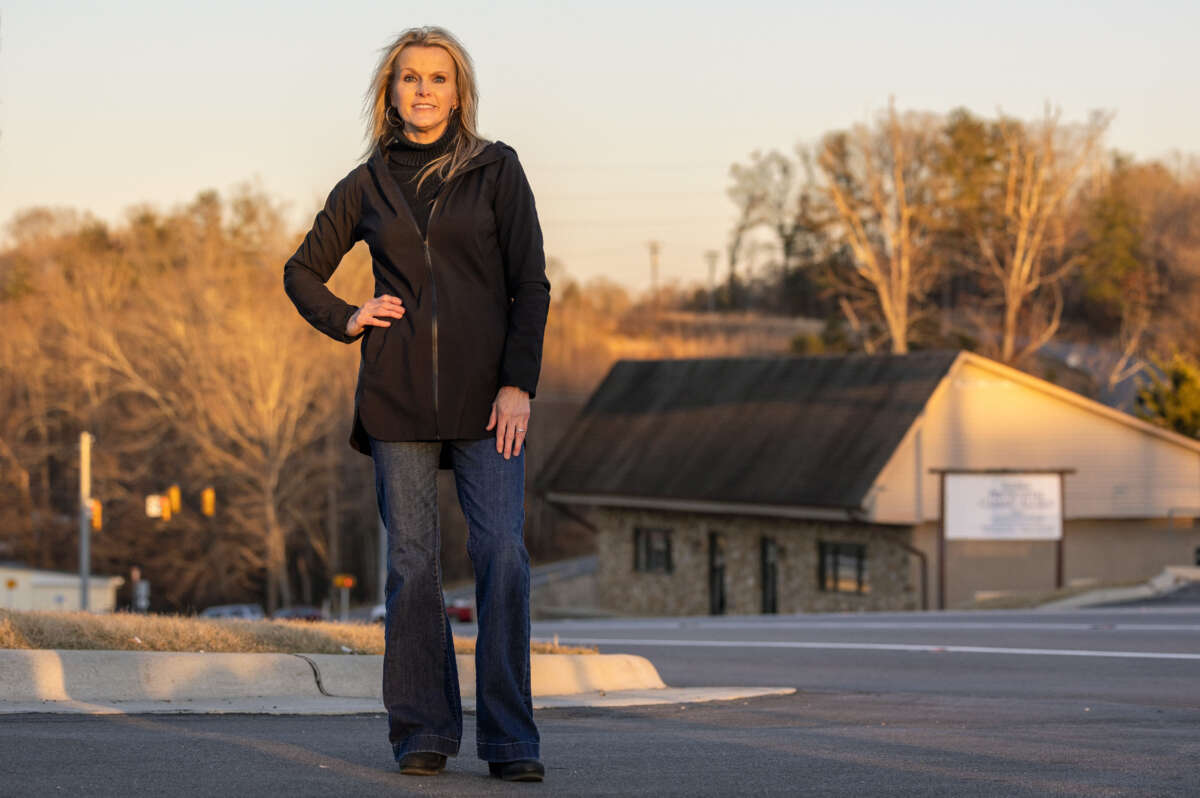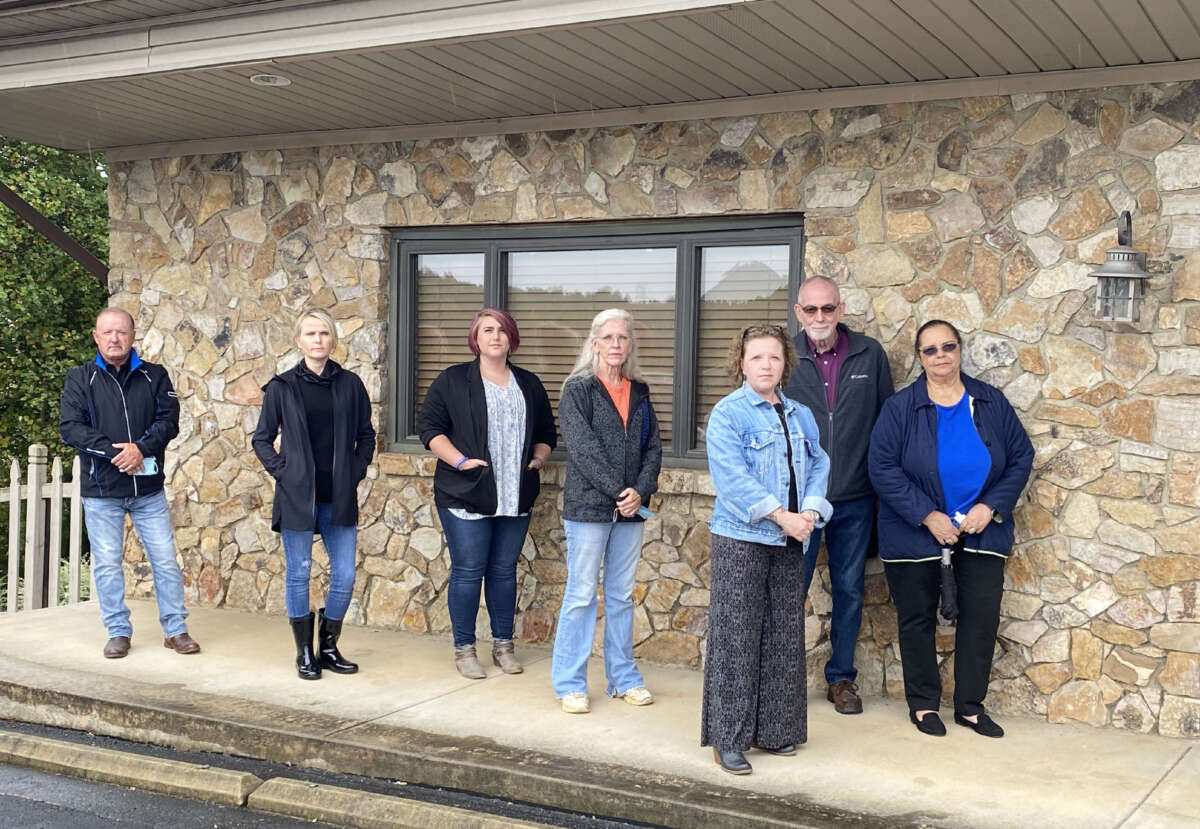Honest, paywall-free news is rare. Please support our boldly independent journalism with a donation of any size.
On August 5, 2023, advocates for people experiencing homelessness in North Wilkesboro, North Carolina, scored an upset victory. They opened a 20-bed shelter for short-term guests in a donated building that once belonged to a dentist and his wife.
The private facility fills a gap that the town ignored for years, despite a prolonged housing crisis that continues to push people onto the streets. Los Angeles and New York City both recently declared record levels of homelessness. Boston, Chicago and Phoenix report similar surges, and smaller communities are sharing the burden.
Before its grand opening in North Wilkesboro, the Catherine H. Barber Memorial Shelter served hundreds of families and individuals at a temporary location outside town. The facility, named after a community activist who raised several foster children through the years, fills an important gap. It is the only shelter for people experiencing homelessness in the county, and many have nowhere else to go. Yet rather than welcome the assistance, which costs taxpayers nothing, North Wilkesboro used zoning laws to block the shelter’s move to a permanent location in the donated building.
Essentially, the city wanted the shelter itself to remain homeless. But the all-volunteer board fought back in court with representation from our public interest law firm, the Institute for Justice, and won the right to open.
“All we want to do is serve our clients and our community, and this location is the perfect spot for us to be able to do that,” said Barber Memorial Shelter Chairwoman Elizabeth Huffman on the day of the ruling.

The case highlights a nationwide trend. Cities and towns not only fail to deliver public solutions to the housing crisis; they also block private solutions. Zoning laws are the preferred tool. Local officials keep their codes outdated, restrictive and complex — sometimes by design — to thwart investment and innovation. Examples abound.
Tiny House Hand Up, a nonprofit organization in Calhoun, Georgia, simply wanted to build affordable houses on its own land. Yet the people in power worried about attracting “riffraff” to the area, so they used zoning laws to halt the project before it started.
The zoning police also got involved in North Las Vegas, Nevada. By the time the city learned about efforts to help those experiencing homelessness in their city, volunteers had already erected 50-square-foot shelters on private land with the owner’s permission. Claiming that the shelters were too small, the city came in with bulldozers and razed the structures, pushing the occupants back onto the streets they had just escaped. The city’s message was that no housing is better than small housing.
Chasidy Decker avoided such heavy-handed tactics in Meridian, Idaho. When the zoning police caught her living in a tiny home on wheels, they let her keep her home parked where she had it — behind a fence on her landlord’s residential lot. But the city evicted Decker just the same. Nobody can stay in an auxiliary dwelling unit, they explained, unless the unit has a permanent foundation.
“I really did not know what to do,” Decker said. “I cried a lot, and started to try to figure out other arrangements.”
Decker’s experience is unfortunately common. Cities increasingly restrict how people can use their land, cementing into code the traditional concept of a nuclear family living in a single-family home. Many municipalities enforce complete bans on auxiliary dwelling units, sometimes called “granny flats,” which may include garage conversions, basement apartments, standalone structures and other self-contained living areas on single-family lots.
Other municipalities enforce square-footage minimums for new housing. They also limit parking, how many renters can live in a neighborhood, and the availability of apartment complexes. The result is pain.
Some families share resources to cope, but even these efforts are punished. Seattle homeowner Anita Adams hit a wall when she tried to build a modest addition to accommodate her two adult children, who needed somewhere to live after college. On top of the costs of the addition, the city demanded Adams hand over $77,000 before she could start.
Policy makers call the expense a “housing affordability” program, which they reinvest in the community. Yet Adams, a longtime government employee with a limited budget, cannot afford to pay. So she and her children must suffer.
Many Seattle families get fed up and move, but finding a place to go can be tricky. Excessive zoning restrictions are driving up prices and making life hard just about everywhere.
Not content with merely regulating land use, some municipalities take the next step and criminalize poverty itself — as if issuing citations can make the problem disappear. The police in Bullhead City, Arizona, arrested a grandmother for feeding residents experiencing homelessness at a public park. Officials in Harris County, Texas, fined a member of a Houston outreach group for similar reasons. Police in Salt Lake City, Utah, weaponized jaywalking laws to intimidate residents of a downtown shelter for unhoused people.
The police in Grants Pass, Oregon, started issuing civil citations to people for sleeping in public when they had nowhere else to go. Some targets of this enforcement campaign fought back with a lawsuit, Johnson v. Grants Pass, and the Ninth U.S. Circuit Court of Appeals sided with them in August 2023.
The city has petitioned the Supreme Court to intervene. But if the ruling stands, states in the Ninth Circuit — Alaska, Arizona, California, Hawaii, Idaho, Montana, Nevada, Oregon and Washington — will be unable to enforce laws against sleeping in public unless they offer adequate shelter space.
Local policy reforms would not eliminate poverty or homelessness. But weaponizing zoning laws and punishing poverty is not the answer. In communities across the country, unhoused people and their allies are using their limited resources to advocate for themselves and find creative solutions to the nation’s housing crisis. Cities can do much to decrease homelessness and lower housing costs in general, just by getting out of the way.
Press freedom is under attack
As Trump cracks down on political speech, independent media is increasingly necessary.
Truthout produces reporting you won’t see in the mainstream: journalism from the frontlines of global conflict, interviews with grassroots movement leaders, high-quality legal analysis and more.
Our work is possible thanks to reader support. Help Truthout catalyze change and social justice — make a tax-deductible monthly or one-time donation today.
